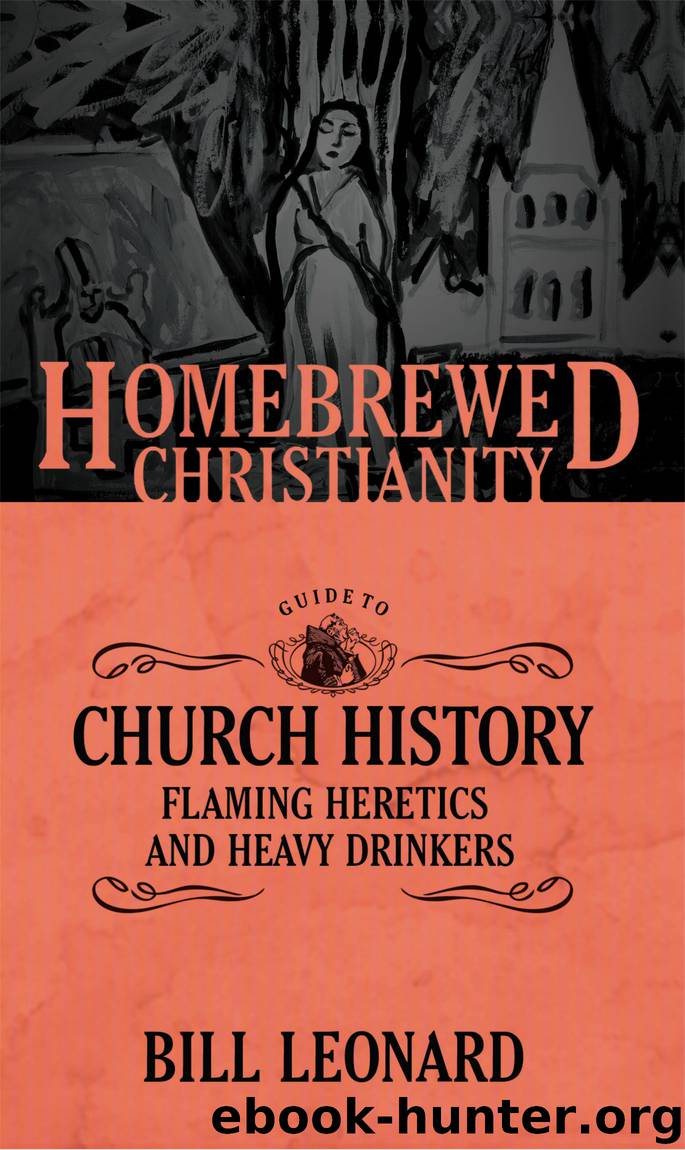The Homebrewed Christianity Guide to Church History by Bill Leonard

Author:Bill Leonard
Language: eng
Format: epub
ISBN: 978-1-5064-0575-9
Publisher: Fortress Press
Published: 2017-06-20T04:00:00+00:00
Simple/Complex Faith
Once the Christians realized that their witness was global, things got considerably more complicated. Proclaiming the possibility of salvation in this world and the next is truly “good news,” but telling people how to be saved in ways both theologically consistent and pragmatically coherent is another thing altogether. In fact, one of the church’s greatest challenges, then and now, is to explain how the objective idea that “God so loved the world” finds its way into the lives and hearts of specific individuals. Clearly, the earliest Christians believed that they had encountered the risen Christ and that the kingdom of God was at hand.
To believe in Jesus was to be “reconciled to God,” receive forgiveness of sins, and gain entrance into a new community, the church. Those who accepted the Jesus Way were energized by gospel ideas and action, even when martyrdom loomed large. Soon, however, Christian communities were compelled to develop processes or procedures for presenting persons the faith, instructing them, and, when necessary, disciplining them for inappropriate behavior and belief. Then, as now, some people sustained the faith, while others relinquished, betrayed, or reinterpreted it considerably. Very quickly, Christian churches were forced to define (and divide over) the process of believing, the standards for entry into the church, and the boundaries defining appropriate faith and action.
Note to self: Sermon series titled “Simplex Faith.”
Becoming a Christian was at once simple and complex. Second-century theologian Justin the Martyr said plainly: “As many as are persuaded and believe that the things are true which are taught by us and said to be true, and undertake to be able to live accordingly, are instructed to pray and to entreat God with fasting, for the remission of their past sins.” Then, Justin says, they are taken “where there is water, and are born again.”[2] Yet Tertullian, his contemporary, was quick to warn that such faith required separation from worldly ideas. He demanded to know, “What is there in common between Athens and Jerusalem?” And concluded: “After Christ Jesus we desire no subtle theories, no acute enquiries after the gospel.”[3] Getting into the church was relatively simple; staying in was another matter altogether.
Download
This site does not store any files on its server. We only index and link to content provided by other sites. Please contact the content providers to delete copyright contents if any and email us, we'll remove relevant links or contents immediately.
The Gnostic Gospels by Pagels Elaine(2527)
Jesus by Paul Johnson(2352)
Devil, The by Almond Philip C(2324)
The Nativity by Geza Vermes(2226)
The Psychedelic Gospels: The Secret History of Hallucinogens in Christianity by Jerry B. Brown(2148)
Forensics by Val McDermid(2087)
Going Clear: Scientology, Hollywood, and the Prison of Belief by Lawrence Wright(1974)
Going Clear by Lawrence Wright(1962)
Barking to the Choir by Gregory Boyle(1819)
Old Testament History by John H. Sailhamer(1809)
Augustine: Conversions to Confessions by Robin Lane Fox(1769)
The Early Centuries - Byzantium 01 by John Julius Norwich(1736)
A Prophet with Honor by William C. Martin(1717)
A History of the Franks by Gregory of Tours(1714)
Dark Mysteries of the Vatican by H. Paul Jeffers(1704)
The Bible Doesn't Say That by Dr. Joel M. Hoffman(1676)
by Christianity & Islam(1627)
The First Crusade by Thomas Asbridge(1601)
The Amish by Steven M. Nolt(1562)
